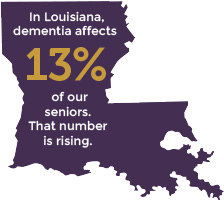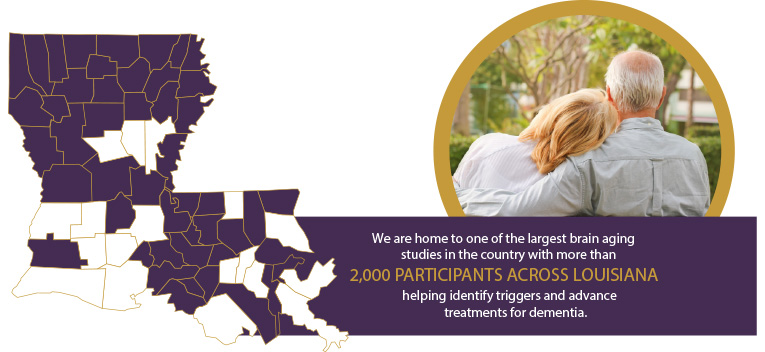Husband Pushes Back against Wife’s Alzheimer’s Disease Diagnosis by Investing in Research to Find a Cure.
John Kovich made a career out of solving problems.
For more than 34 years, the chemical engineer applied a combination of physics, chemistry, biology and mathematical principles to meet the daily challenges that arose in the operation of ExxonMobil’s Baton Rouge Chemical Plant.
So, when his wife, Faye, was diagnosed with early onset Alzheimer’s disease at age 53, John immediately looked to science to provide solutions.

While John had a basic knowledge of the disease from media coverage, “I was unaware there’s no treatment, prevention or cure,” he recalls. “So, when I heard the medicines just mask the symptoms and don’t do anything to slow the disease—as an engineer—I thought: That doesn’t sound right. Surely there must be something I can do; but, there wasn’t.”
Because John’s approach to problem solving was already grounded in the scientific method, pursuing participation in a clinical trial seemed the next logical step. While the Koviches were willing to go anywhere to get the expertise they sought, an expert in Chicago cautioned travel would get exponentially harder as the disease progressed.
Soon, their search for a clinical trial close to home quickly led to Pennington Biomedical’s Institute for Dementia Research and Prevention (IDRP) and a meeting with manager Rob Brouillette. The IDRP is home to one of the largest brain aging studies in the country with more that 2,000 participants across Louisiana helping identify triggers and advance treatments of dementia.

While Faye did not qualify for any trials at the time, John found the information culled from those evaluations and subsequent conversations with Brouillette to be invaluable in a difficult decision-making process.
Besides addressing the daily dilemmas regarding Faye’s care, John soon found himself trying to find answers for the next generation. Even though there’s not a strong genetic link, “My kids, my nieces and nephews all have this worry in the back of their minds. What can you tell them?” he asks.
“If heart disease runs in your family, you exercise and eat right. You do things to improve your odds. If colon cancer runs in your family, you get a colonoscopy. With Alzheimer’s, what can you do? Other than sit there and worry.”
John decided to take action by investing in the IDRP, which is the only Alzheimer’s Disease Cooperative Study site between Houston and Birmingham, ranking it among other well-known institutions such as Yale and the Mayo Clinic.
“While Alzheimer’s is the sixth leading killer in the United States and the numbers are growing, the public hasn’t become outraged enough to make it a priority,” he explains. “So, Alzheimer’s research now is where cancer research was 30 years ago. I support the IDRP because it’s trying to prevent and cure Alzheimer’s.”
Click here for more information on the LABrains study or call 225-763-2973.
